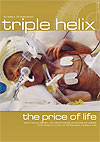The hidden costs of alcohol abuse
A recent survey shows that 14% of Britons admit to having injured themselves while drunk; 11% have seen a friend or relative's relationship end because of alcohol abuse; and 9% have taken time off work after heavy drinking. Young people are disproportionately likely to suffer harm. Some 27% of 18 to 24-year-olds and 31% of 25 to 34-year-olds admit injuring themselves while drunk, while 12% and 15% respectively of the same age groups have taken time off work due to drink.
(The Guardian, 1 February, 2011. bit.ly/eXZurk)
Pension crisis set to get worse
Government figures reveal that 11 million people alive today (17.6% of the population) will live beyond their 100th birthdays. But analysts predict that without radical reform of the pension system many retirees will face a penniless third age. Joanne Segars, chief executive of the National Association of Pension Funds, said: 'It's fantastic there are millions of centenarians in the pipeline but this will also raise the pressure on the UK's already-strained pension system. An ageing population is one of the toughest challenges our society faces.'
(The Daily Express 19 April, 2011. bit.ly/kE3xSP)
Social care budgets for the elderly cut
Social care budgets for the elderly in England will be cut this year despite government promises to invest more in social care. Age UK research involving 110 councils, suggests that budgets for social care for the elderly would be cut by 8.4%, equivalent to £610m. Councillor David Rogers, of the Local Government Association (LGA), pointed out that while extra money had been promised by ministers for social care, it was being cancelled out by the wider cuts to local government funding.
(BBC 27 June, 2011. bbc.in/jT2a7k)
Substituted judgment
At an recent Yale event Professor Daniel Sulmasy stated that authenticity not autonomy should guide end of life decision making. Authenticity, he said, includes knowing a patient's fundamental moral commitments; whom the patient loves, what the patient stands for, and how the patient has acted in the world. Clinicians should make medical decisions on the basis of what they know about the patient as a unique person.
(Yale News 13 April, 2011. bit.ly/fG9Qpl)
Harvesting organs
Using organs from euthanised patients has become an established procedure in Belgium, after it was legalised in 2002. A team at a hospital in Leuven announced that it had successfully transplanted lungs from four euthanised patients between 2007 and 2009. Given that half of all euthanasia cases in Belgium are involuntary, it must be only a matter of time before the organs are taken from patients who are euthanised without their consent.
(Press release, Pabst Science Publishers 6 June, 2011. bit.ly/mrQk4y)
Three parent IVF
Three parent in vitro fertilisation (IVF) has been developed at Newcastle University. The technique involves swapping DNA from a fertilised human egg into an egg from a donor. By intervening in the fertilisation process to remove malfunctioning mitochondrial DNA the resulting embryo inherits nuclear DNA from both its parents, but mitochondrial DNA from a second 'mother'. The Department of Health has asked the Human Fertilisation andEmbryology Authority 'to assess the effectiveness and safety' of the technique, which is currently banned under British law.
(Reuters, 11 March, 2011. reut.rs/hpPnxH)
Putin's solution
The Russian President, has promised to spend £33 billion to boost the country's flagging population by up to a third over the next four years. As part of a series of measures aimed at making Russia less vulnerable to 'external threats' he has pledged to boost the country's birth rate by between 25 and 30 per cent by 2015.
(The Telegraph 20 April, 2011. tgr.ph/g2Mxg7)
Hungary threatened for promoting adoption
The Hungarian Government has been threatened with financial penalties for using EU money to fund the campaign promoting adoption over abortion. The advertisement reads:
'I understand it if you aren't ready for me. But think twice, and put me up for adoption. Let me live!'. EU Justice Commissioner Viviane Reding said that the use of EU money was not in line with EU values and funding rules.
(Europolitics, 10 June 2011. bit.ly/iMIluB)
Girls who are boys
A report by the Hindustan Times into the use of genitoplasty on female infants claims that hundreds of girls are being turned into boys each year in the city of Indore, Madhya Pradesh. The procedure which can cost up to £2,000 is driven by parents' deep rooted cultural preferences for boys. In response to the report the Prime Minister's Office has ordered an investigation into the claims and the government of Madhya Pradesh is exploring the possibility of legal proceedings against the practitioners involved.
(Hindustan Times, 26 June 2011. bit.ly/lHtcpg)
Demand for cosmetic treatments rises
Latest estimates are that approximately 100,000 people from the UK will travel abroad for medical treatment this year including 40,000 for dental treatment and 15,000 for cosmetic surgery. The number of 'medical tourists' from the UK is growing by 20% year on year. Writing in the International Medical Travel Journal. Ian Yougman suggests that the effect of increased waiting times, limited numbers of NHS dentists and a recent £6 million award against a UK cosmetic surgeon make it likely those numbers will rise further in 2012.
(International Medical Travel Journal, 24 June 2011. bit.ly/kYo7bW)































